Firearms in Estate Administration – Can Your Beneficiary Receive The Gun?
Serving as an Executor can involve a lot more than most individuals imagine when they contemplate what an Executor does in practice. As an example, in Texas, you can’t represent yourself (you must retain an attorney), you must qualify based upon the provisions of the Texas Estates Code and you can’t legally act as Executor until the will has been admitted to probate, you have taken an oath of office and the clerk has issued “Letters Testamentary.”

Once qualified, you will be faced with a host of unfamiliar issues, such as the disposal of junk, disposal of hazardous waste and prescription medicine, how to get items valued, preservation of family memories and dealing with firearms. On its face, disposing of a firearm in an estate can appear like the disposition of any personal property, yet it is not that simple. The Executor needs to make sure that the estate beneficiary can receive or possess the firearm.
Firearm Laws
There are several laws at the state, federal, and local level which govern firearms. Generally, these laws impose strict penalties for a violation regardless of intent. Regarding the choice of law the general rule for gun laws is that a) federal firearm law always applies, and b) state law that is applicable to the situation is where the firearm is located applies.

Executors and Personal Representatives need to take special care regarding firearms and if they don’t have the knowledge or skill they should associate with someone who does – this involves gun safety, operation, valuation and the law. As an Executor or Personal Representative, you should never assume that a beneficiary or heir has knowledge or experience regarding firearms.
As mentioned above, if the heir lives in the same state where the firearm is located, then the Personal Representative and the heir must comply with federal law and the laws of that state. However, if the heir lives in another state, then the Personal Representative needs to be concerned with federal law and the laws of both states. The Personal Representative should be mindful that federal law applies at all times.

It is important to know that there are federal firearms laws that can affect the probate process:
Prohibited Persons
As defined by federal law there are nine categories of “prohibited persons,” who are prohibited by law from possessing firearms or ammunition. 18 U.S.C. § 922(g). In the context of estate or probate, the category of prohibited persons will make it difficult for some individuals to serve as the personal representative for an estate which includes firearms. The prohibition will also prohibit certain individuals from inheriting firearms.
National Firearms Act
The NFA generally requires firearms such as machine guns, suppressors, silencers, short-barreled rifle or shotguns, destructive devices and other weapons to be registered with the ATF. The law prohibits any person other than the registered owner from possessing an NFA firearm. The process regarding registration will be discussed below.
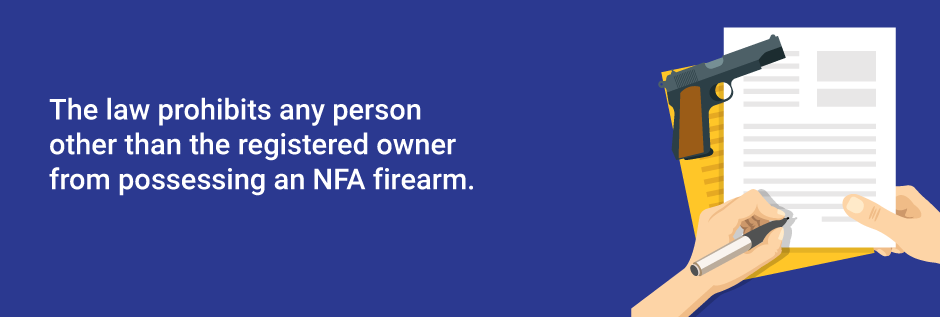
Age
Persons under age 18 may not lawfully possess a firearm. Therefore, in the context of inheritance, this means that a minor may own a firearm, but not lawfully possess them. Generally, in an estate or probate context trust are used for the minor to inherit the guns. The other method is for the minor to own the gun but have the parent or guardian possess them.

NICS Check
Federal law requires each person purchasing a gun from a dealer to complete a Form 4473 and submit to a National Instant Check System (“NICS”) background check.
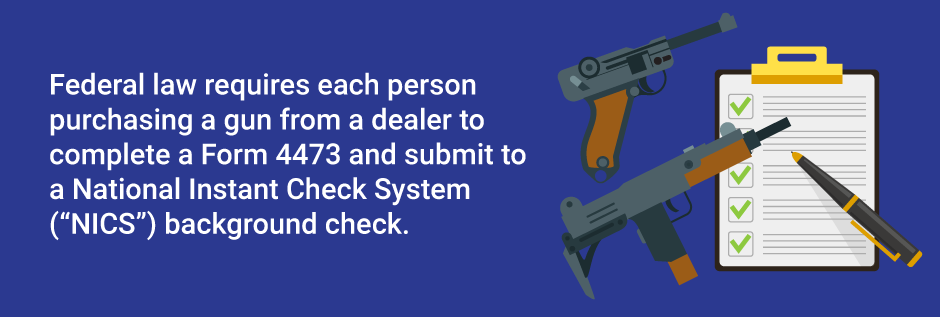
Texas Penal Code Chapter 46
Texas also has firearm laws that are contained in Texas Penal Code Chapter 46.
Handgun Prohibitions
Texas law generally prohibits anyone from “carrying” a handgun, although the exceptions are numerous. See Texas Penal Code § 46.02. Note, the prohibition on carrying a handgun does not apply to long guns (shotguns and rifles).
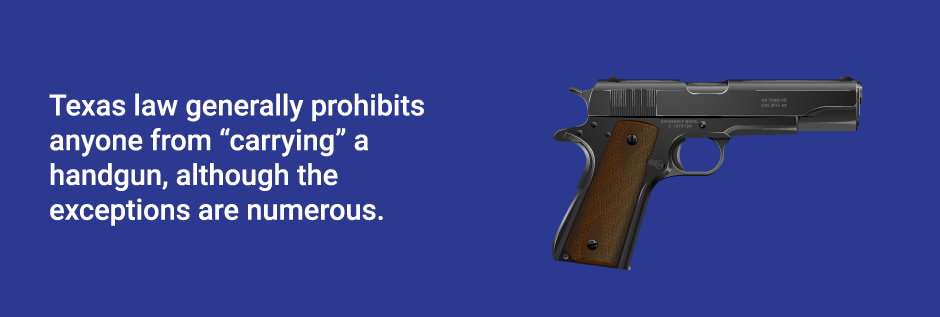
Prohibited Places
Texas law generally prohibits possession of all firearms in certain sensitive areas such as schools and colleges, court buildings, polling places, jails and prisons, bars and other areas where alcoholic beverages are stored, secured areas of airports, racetracks, and execution places. Texas Penal Code § 46.03.
Prohibited Persons
Texas law prohibits persons who have been convicted of felonies or certain types of assaults perpetrated against family members from possessing firearms. Texas Penal Code § 46.04.
Prohibited Weapons
Texas law prohibits any person from possessing an “explosive weapon” (which includes some items considered to be destructive devices under federal law), machine gun, short-barreled firearm, or “silencer,” along with some other weapons that are not firearms. See Texas Penal Code § 46.05. Note, there is an exception if the firearm or other item is properly registered through ATF.
Texas also issues licenses for individuals to carry a handgun (“LTC’s”). Texas Government Code Chapter 411, Subchapter H; Texas Penal Code § 46.15(b)(6). A license allows the holder to carry a handgun everywhere in the state, except in locations where all firearms are prohibited under § 46.03. There are also provisions for reciprocity with other states.
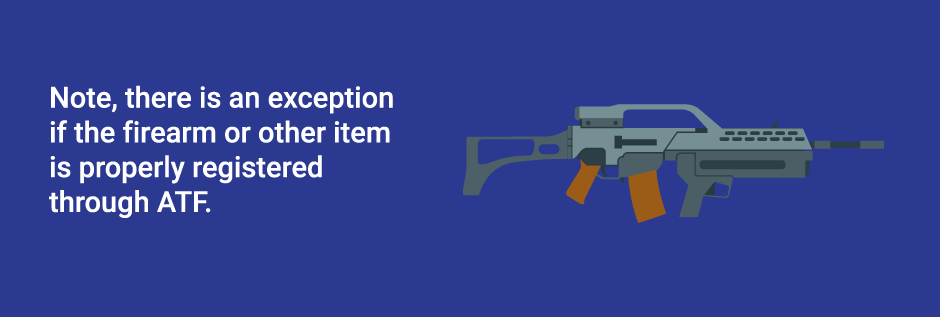
Other State Laws
Regarding other states, the same general concerns apply, and state and local law should be examined. It may also be necessary to associate with local counsel who is familiar with firearm law in that state. The Personal Representative should consider these questions:
- Is the person receiving the firearm prohibited?
- Is there a prohibition on the type of firearm? The Executor needs to understand that there are several types of firearms.
- Is there a location prohibition?
- Does the firearm have to be registered?
- Is a permit required?
- Does the state have a prohibition or other restriction on NFA firearms?
- Is there a restriction on transportation?
- Is there a restriction on storage of the firearm?

Verifying Beneficiary Ability to Own the Firearm
The number one rule of probate is to read the Will. Upon taking office and reading the will of the decedent, the Personal Representative can readily identify who is legally entitled to the firearm under the terms of the Will. The issue aside from the provisions of a will is can the beneficiary legally own the firearm. Under 18 U.S.C § 922 (d), a Personal Representative can be held liable for distributing a firearm to a beneficiary who is unable to possess the firearm.

The Gun Control Act
The Gun Control Act (GCA), codified at 18 U.S.C. § 922 (g), makes it unlawful for certain categories of persons to ship, transport, receive, or possess firearms or ammunition, to include any person:
- convicted in any court of a crime punishable by imprisonment for a term exceeding one year;
- who is a fugitive from justice;
- who is an unlawful user of or addicted to any controlled substance (as defined in section 102 of the Controlled Substances Act, codified at 21 U.S.C. § 802);
- who has been adjudicated as a mental defective or has been committed to any mental institution;
- who is an illegal alien;
- who has been discharged from the Armed Forces under dishonorable conditions;
- who has renounced his or her United States citizenship;
- who is subject to a court order restraining the person from harassing, stalking, or threatening an intimate partner or child of the intimate partner; or
- who has been convicted of a misdemeanor crime of domestic violence.
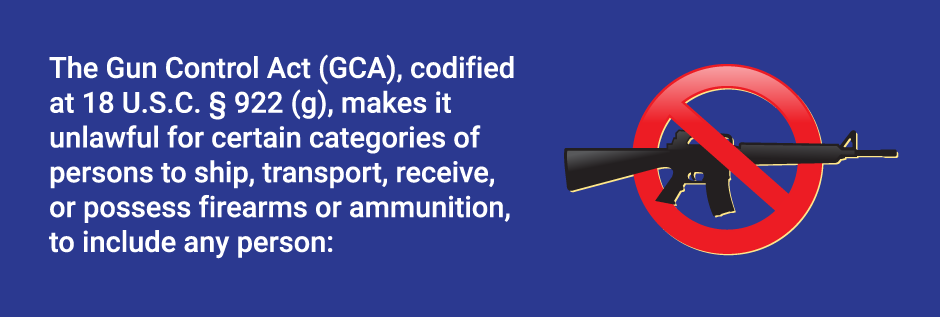
The GCA at 18 U.S.C. § 992(n) also makes it unlawful for any person under indictment for a crime punishable by imprisonment for a term exceeding one year to ship, transport, or receive firearms or ammunition.
Further, the GCA at 18 U.S.C. § 922(d) makes it unlawful to sell or otherwise dispose of firearms or ammunition to any person who is prohibited from shipping, transporting, receiving, or possessing firearms or ammunition.
The Arms Export Control Act
The Arms Export Control Act (AECA) prohibits the issuance of licenses to persons who have been convicted of:
- Section 38 of the AECA, 22 USC 2778;
- Section 11 of the Export Administration Act of 1979, 60 USC App. 2410;
- Sections 7903, 794, or 798 of Title 18, USC, relating to espionage involving defense or classified information;
- Section 16 of the Trading with the Enemy Act, 50 USC App. 16;
- Section 30A of the Securities Exchange Act of 1934, 15 USC 78dd-1, or section 104 of the Foreign Corrupt Practices Act, 15 USC 78dd-2;
- Chapter 105 of Title 18, USC, relating to sabotage;
- Section 4(b) of the Internal Security Act of 1950, 50 USC 783(b), relating to communication of classified information;
- Sections 57, 92, 101, 104, 222, 224, 225, or 226 of the Atomic Energy Act of 1954, 42 USC 2077 2122, 2131, 2234, 2272, 2275, and 2276;
- Section 601 of the National Security Act of 1947, 50 USC 421, relating to the protection of the identity of undercover intelligence officers, agents, and other sources;
- Section 371 of Title 17, USC, when it involves conspiracy to violate any of the above statutes; and
- International Emergency Economic Powers Act, 50 USC 1702 and 1705.
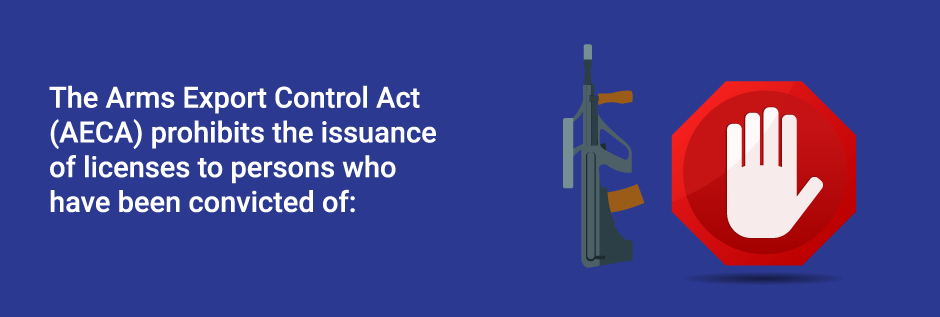
What’s the Bottom Line?
As the above illustrates, firearms in Estate Administration can present unseen challenges for an Executor. Regarding any probate in Texas or otherwise, you should seek the assistance of a qualified probate attorney. If one of the top-rated attorneys at The Wright Firm, LLP can provide assistance, please contact us at (972) 353-4600 or visit us at thewrightlawyers.com.


Leave a Reply
Want to join the discussion?Feel free to contribute!